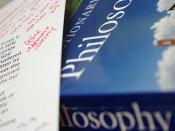Euthyphro?s first definition of piety suggests that those who commit injustices is pious, and not prosecuting them is impious. Socrates makes the point that prosecuting those who commit injustices is pious is merely an example of a pious act, not a definition of piety. Socrates says to Euthyohro. ?you did nto teach me adequately when I asked what the pious was, but you told me that?prosecuting your fater, is pious?(6d). Socrates questions Euthyphro about weather there are other possible acts of piety, and Euthyphro realizes that there are a great number of pious acts that do not involve prosecuting a wrongdoer. Euthyphro is pressed by Socrates to come up with a more general definition to identify a basic standard by which all pious acts can be recognized as.
Socrates tells Euthyphro to bear in mind that he did not ask Euthyphro to tell him of the many pious actions, but rather of the ?form itself that makes all pious actions pious?(6e).
Euthyphro changes mindset and enlightens Socrates with a second definition that piety is what is loved by all the gods. His original definition was unsatisifying to Socrates because it only identified a certain class of actions that Euthyphro considers pious without providing an overarching defination. Socrates is happy with the fact that Euthyphro gave a more general answer to the question, but makes the point that the gods themselves often quarrel. The quarrels that arise do not arise over questions of fact, because agreements and conclusions can occur through investigation, but rather arise over questions of moral value, such as what is pious and/or virtuous. Socrates then concurs along with Euthyphro that ?the same things are loved by the gods and hated by the gods, and would be both god-loved and god-hated?(8a). It follows that what might be...


